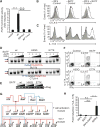A genomic regulatory element that directs assembly and function of immune-specific AP-1-IRF complexes
- PMID: 22983707
- PMCID: PMC5789805
- DOI: 10.1126/science.1228309
A genomic regulatory element that directs assembly and function of immune-specific AP-1-IRF complexes
Abstract
Interferon regulatory factor 4 (IRF4) and IRF8 regulate B, T, macrophage, and dendritic cell differentiation. They are recruited to cis-regulatory Ets-IRF composite elements by PU.1 or Spi-B. How these IRFs target genes in most T cells is enigmatic given the absence of specific Ets partners. Chromatin immunoprecipitation sequencing in T helper 17 (T(H)17) cells reveals that IRF4 targets sequences enriched for activating protein 1 (AP-1)-IRF composite elements (AICEs) that are co-bound by BATF, an AP-1 factor required for T(H)17, B, and dendritic cell differentiation. IRF4 and BATF bind cooperatively to structurally divergent AICEs to promote gene activation and T(H)17 differentiation. The AICE motif directs assembly of IRF4 or IRF8 with BATF heterodimers and is also used in T(H)2, B, and dendritic cells. This genomic regulatory element and cognate factors appear to have evolved to integrate diverse immunomodulatory signals.
Figures




Comment in
-
Immunology. Cooperative transcription factor complexes in control.Science. 2012 Nov 16;338(6109):891-2. doi: 10.1126/science.1231310. Science. 2012. PMID: 23161983 Free PMC article.
References
-
- Tamura T, Yanai H, Savitsky D, Taniguchi T. Annu Rev Immunol. 2008;26:535. - PubMed
-
- Lohoff M, Mak TW. Nat Rev Immunol. 2005;5:125. - PubMed
-
- De Silva NS, Simonetti G, Heise N, Klein U. Immunol Rev. 2012;247:73. - PubMed
-
- Klein U, et al. Nat Immunol. 2006;7:773. - PubMed
-
- Sciammas R, et al. Immunity. 2006;25:225. - PubMed
Publication types
MeSH terms
Substances
Associated data
- Actions
Grants and funding
LinkOut - more resources
Full Text Sources
Other Literature Sources
Molecular Biology Databases
Research Materials

